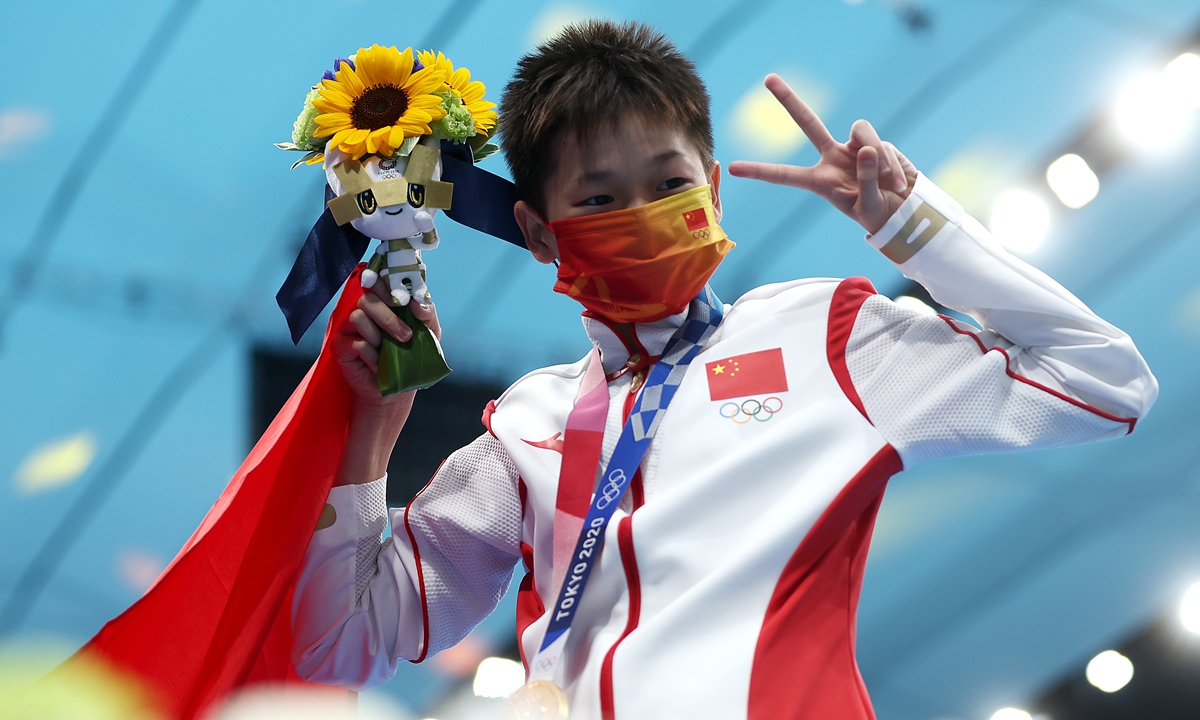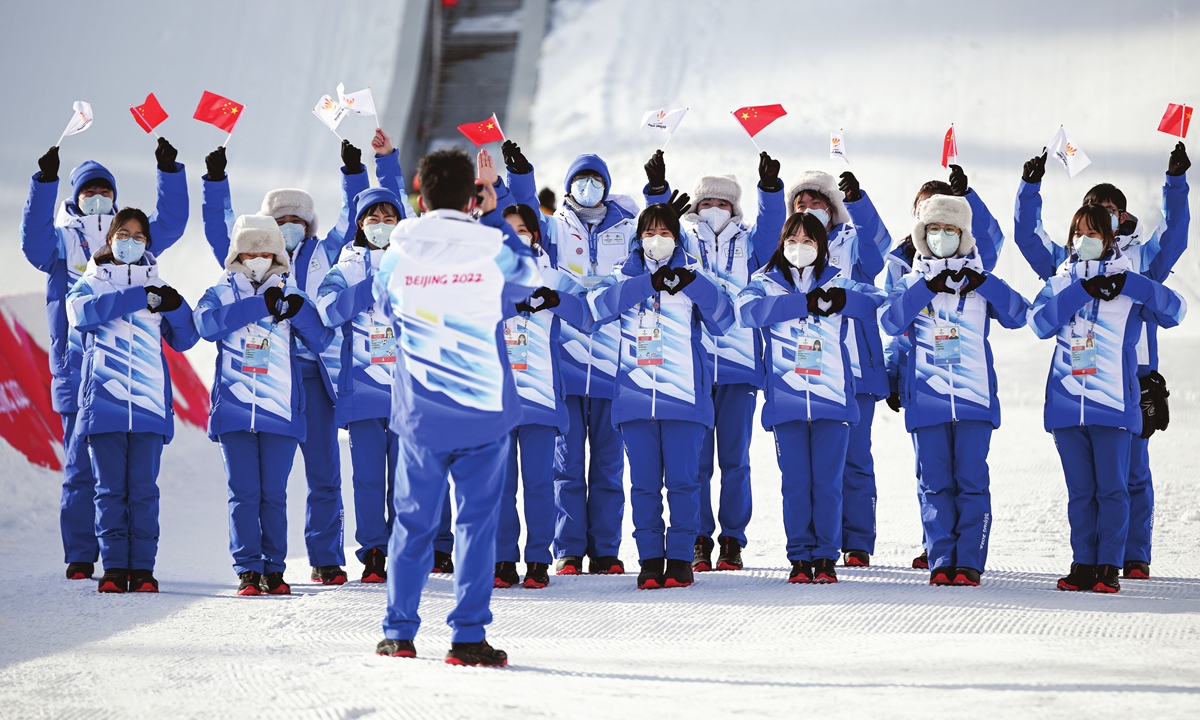Peking University, February 10, 2022: Born at the turn of the millennial when China had just won the bid to host the Olympics, China's Gen-Z grew up witnessing the Beijing 2008 Olympic Games, and now, this generation has taken on leading roles in the ongoing Winter Olympics' grand stage, as well as other diverse spaces and industries around China, showcasing confidence, patriotism, globalism, and multiculturalism.
17-year-old Su Yiming skates during the Men's Snowboard Slopestyle competition at the Beijing 2022 Winter Olympic Games on February 7, 2022. Photo: VCG
In two days, three of China's young athletes born after 2000 won China three medals at the Beijing 2022 Winter Olympics, including one gold and two silvers, making them sensations in the country.
Gu Ailing, champion of Women's Freeski Big Air final, has garnered global attention with her confidence, diligence, and vitality. "It's your loss if you don't like me," she said when replying to negativity aimed at her.
Chinese netizens could not stop talking about Su Yiming's story. Once a child actor playing a "little" skating prodigy hero, he, at 17, became the first person in the world to ever pull off an insane "Backslide 1980 Indy Crail" skating move in October 2021.
Short-track skater Li Wenlong who just celebrated his 21st birthday, earned himself recognition for outstanding teamwork. His hard work also won a silver medal in men's 1,000m short track speed skating, a breakthrough for this young skater.
There are at least 12 Gen-Z athletes in the Beijing 2022 Winter Olympic Chinese delegation. Among them are 19-year-old Zhao Dan, China's flag bearer at the opening ceremony, 21-year-old captain of China's women's curling team, Han Yu, and Dilnigar Ilhamjan and Zhao Jiawen, who jointly lit the Olympic flame.
Light shines all around
The post-millennial generation didn't just begin to shine on the Beijing Winter Olympics stage. At the 2016 Rio de Janeiro Olympics, China's post-2000s generation made its debut at the Olympic Games. That year 15-year-old Ren Qian, won gold in the women's single 10-meter dive, becoming China's first post-2000s Olympic champion.
Starting from the Tokyo Olympic Games in 2021, the Gen-Z has become an athletic group leader pursuing loftier, faster, and stronger goals. Yang Qian, a Gen-Z sport shooter, won the first gold medal of the Games for the Chinese delegation. At the age of 14, the diver Quan Hongchan won the gold medal in women's 10-meter platform diving after being awarded full marks in three jumps, which was undoubtedly a point of great envy for other countries' coaches. Sun Yingsha secured the women's table tennis team title for the Games and is currently the first Gen-Z player to be ranked first in the ITTF Women's World Ranking at the youngest age on the list.
In addition to the outstanding achievements made by Gen-Z athletes who exemplify China's sporting future, the performance of Chinese young people in other fields and industries has also been noticed globally.
According to the Beijing Municipal Education Commission, there are 14,000 teachers and students from the capital's schools volunteering at the Winter Olympics. Among them are many Gen-Zers.
Quan Hongchan Photo: VCG
Du Anna, a student at the Beijing Forestry University, invented the "Navigation QR code," which compiles information regarding the Winter Olympic Shuttle bus into an online table, and generates QR codes and post it on the bus station notice board, so that athletes, coaches, and journalists can easily and instantly obtain the most accurate bus schedule.
Pan Yuanzhi, a graduate of Xi'an Jiaotong University's 2016 class, was named in Forbes China's Top 30 Under 30 2020 list. His venture, the production and sale of high-powerchip heat dissipation materials and customized heat dissipation substrates, has filled a gap in the domestic market while breaking foreign technological monopolies.
In 2020, among the more than 40,000 health care workers supporting Central China's Hubei Province, the epicenter of the COVID-19 epidemic, there were more than 12,000 Gen-Y and Gen-Z workers among the ranks. These young doctors and nurses rushed to the front line, safeguarding the lives of millions of people.
A bigger stage provided by booming China
China's Gen-Z is a witness of the rapid development of a diverse and modern China, especially in the past decade.
Zhang Yunyi, 22, a Beijing native, recalled visiting the Bird Nest, venue of the Beijing 2008 Summer Olympics, before the Games kicked off. He believed between the two Olympics of Beijing are the great development and change of China.
"Hosting the Olympics is a comprehensive test for a country. Now we can see China's progress in all aspects - public service, transportation, and technology - which shows the country's prosperity, vibrancy, openness, and vitality," Zhang told the Global Times.
"I see China as a mature country facing the future. China's voice is growing in strength, and China's actions are increasingly becoming recognized," he said.
"It's interesting and gratifying that now our idols are our peers," Lin Qianqian, a Gen-Z undergraduate student at a college in Fuzhou, Fujian Province, told the Global Times.
In daily life, Lin actively volunteers in activities such as epidemic prevention work in the community, and teaching in mountainous areas over the summer holidays.
"We are a very happy generation, the development of our country has provided us with a more privileged life than our parents. Now our time has come," Lin said.
Without the memory of a previously poor and weak China, this young generation is more confident and broader-minded than its predecessors, said Zhang Yiwu, a professor of cultural studies at Peking University. "They no longer look up to the West, and are proud of being Chinese."
A booming China provides the Gen-Zers a good material basis to pursue their dreams, including in sports, according to Zhang. "With a fast-expanding middle-income group, an increasing number of young people can afford to partake in the sports they love, including relatively expensive winter sports," he told the Global Times.
Young volunteers take a group photo at the National Ski Jumping Center on January 28, 2022 in Zhangjiakou, North China's Hebei Province. Photo: VCG
"Take a look at China's Gen-Z sports stars in the current Winter Olympics; they were born when China won the bid for the 2008 Summer Olympic Games in 2001, and they grew up in the years that China was preparing for and successfully hosted the Games," Zhang added. "They are naturally more interested in sports, and willing to show themselves on global stages.
In Shanghai, soccer coach Ye Zhijing said she was impressed by the passion, optimism, and well-rounded development of the Gen-Z players in her team. Ye coached a professional women's football team under Shanghai Greenland Shenhua Football Club, which consists of 26 players aged between 18 and 24. The team won gold in the Shanghai Super Football League (SSFL) in 2021.
"They train hard like their predecessors, but enjoy a more colorful life," Ye told the Global Times. Unlike previous professional players who would stay at the training center all day, Ye said the players in her team study at Shanghai University of Sport as ordinary students after trainings, busy themselves with English classes, and other bits of knowledge acquisition. "They also play basketball, video games on their mobile phone."
Confident, outgoing, and versatile - the booming China has shaped images of the country's younger generation, observers said. "And now, these youngsters are continuing to embody the spirit of progress and advancement of the Chinese people, contributing to China's future development," Zhang said.


